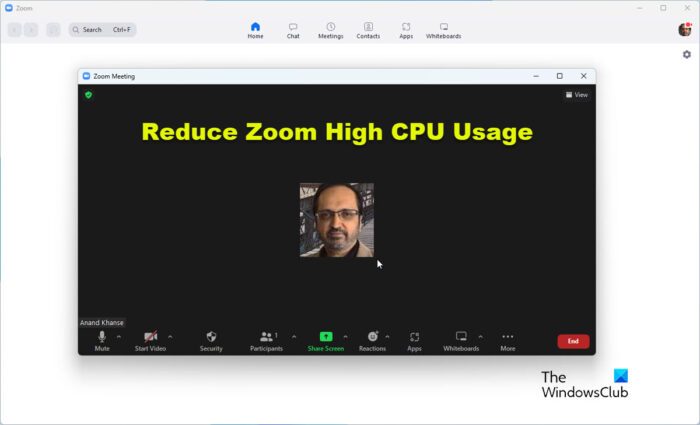Is your Zoom app using a lot of CPU, Memory and other computer resources? If so, then in this post, we will show you how to reduce Zoom High CPU Usage. Zoom is not a light application, and it engages a lot of system resources while at work. All these resources cause high CPU utilization on the system.

How to reduce Zoom High CPU Usage
If you face Zoom High CPU Usage, here are some suggestions to help you resolve the issue:
- Switch OFF your camera
- Don’t use virtual backgrounds and filters
- Don’t record meetings
- Disable Hardware acceleration
- Turn off Automatically adjust the microphone volume
- Update Graphics drivers
1] Switch OFF your camera
If Zoom causes high CPU usage, the element utilizing the most resources is the camera. You can switch OFF the camera to save on this and the CPU utilization will drop immediately. The procedure to disable the camera for the Zoom application is as follows:
- Right-click on the Start button and select Settings from the window.
- In the Settings window, go to the Privacy & Security tab on the list on the left-hand side.
- In the right pane, select Camera under App permissions.
- Scroll down to the list of apps that require permission for using the Camera and turn OFF the switch associated with the Zoom application.
2] Don’t use virtual backgrounds and filters
Virtual backgrounds and filters can raise the system usage significantly. If you are facing high CPU usage due to the Zoom application, then try disabling the virtual backgrounds and filters as follows:
- Open the Zoom application.
- Click on your profile picture.
- Select Settings from the menu.
- Go to the Background & Effects tab on the list on the left-hand side.
- In the right pane, select None for both Virtual backgrounds and Virtual filters.
3] Don’t record meetings
Recording meetings or videos on Zoom requires extra system resources. The option to record screen sharing is enabled by default. As for the video in general, you get the option to record it. Do not record the video. As for disabling the option to record screen sharing by default the procedure is as follows:
- Click on your profile picture.
- Select Settings from the menu.
- Go to the Recording tab on the list on the left-hand side.
- In the right pane, uncheck the box associated with Record video during screen sharing.
4] Disable Hardware acceleration
Hardware acceleration impacts the quality of video and audio on an application. However, this consumes significant system resources. To reduce CPU utilization, you can disable Hardware acceleration for the Zoom application. The procedure is as follows:
- Click on your profile picture.
- Select Settings from the menu.
- Go to the Video tab on the list on the left-hand side.
- Select Advanced.
- Under Use hardware acceleration for, uncheck all the boxes.
5] Turn off Automatically adjust the microphone volume
The option to Automatically adjust microphone volume can be problematic in the sense that it will push CPU usage higher. You can disable it as follows:
- Click on your profile picture.
- Select Settings from the menu.
- Go to the Audio tab on the list on the left-hand side.
- Uncheck the box associated with Automatically adjust the microphone volume.
6] Update Graphics drivers
Update Graphics drivers as follows:
- Launch Windows 11 Settings
- Select Windows Update from the left side
- Click on Advanced options on the right side
- Select Optional updates on the right side
- Expand Driver updates to see if any Graphics or other driver updates are available.
Why does Zoom consume so much CPU?
Zoom uses several things in the background that require a high amount of CPU resources. For example, you must turn on your camera and microphone in order to continue with the meeting. On the other hand, there are recordings, virtual backgrounds, hardware acceleration, etc.
How do I reduce Zoom power usage?
To reduce the high amount of power usage by Zoom on Windows 11 or Windows 10 computer, you need to follow the above-mentioned tips and tricks. That said, you can turn off the camera and microphone first. Then, you should turn off the hardware acceleration and stop recording your meetings.